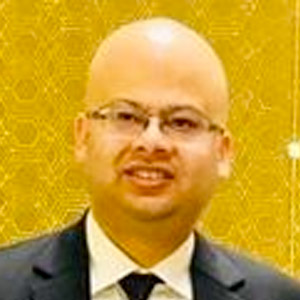
Syed Ashar is a seasoned senior digital transformation leader with over two decades of experience driving organisational success through technology-driven innovations. With a deep understanding of the digital landscape and a track record of delivering impactful results, Ashar has become a trusted advisor to C-suite executives across different industries within the region. Throughout his career, Ashar has spearheaded numerous large-scale digital initiatives, leveraging emerging technologies to streamline operations, enhance customer experiences, and drive revenue growth. His strategic vision and ability to align technology with business objectives have consistently yielded transformative outcomes for organisations.
He will defend his Executive Doctorate of Business Administration (EDBA) in September 2023, on the theme “Success Factors for Adopting Hyper-Automation Technologies. Insights from the Case Study of a Large Conglomerate” under the supervision of Professor Cécile Godé, CERGAM – Faculty of Economics and Management at Aix-Marseille University. His thesis focuses on studying the success factors that explain the adoption of Hyper-Automation technologies in the back-end operational and customer-facing processes. The research methodology used is qualitative and the method is a case study to study the phenomena in a large conglomerate.
Thesis Direction
Pr Cécile Godé
Thesis Title
Success Factors for Adopting Hyper-Automation Technologies. Insights from the Case Study of a Large Conglomerate
Abstract
This research focuses on hyper-automation technologies like – Business Process Management (BPM), Robotic Process Automation (RPA), Artificial Intelligence & Machine Learning (AI/ML) based OCR engines and Process Mining – which support the digital transformation of back-end operational and customer-facing processes. The study addresses the following research question: What are the success factors which explain the hyper-automation technologies adoption in the back-end operational and customer-facing processes? To address the research question, we used the Technology-Organization-Environment (TOE) framework, which provides an organizational-level theory to describe how technological, organizational and environmental context may influence adoption decisions. We used a qualitative case study method to analyse hyper-automation adoption in a leading global property development company. Our main findings show that there are various success factors that contribute to the adoption trend of hyper-automation technologies which are categorised under the three dimensions of the TOE model. We contributed in addition to the existing literature available on the subject and identified various new success factors which were not available in the current literature. These newly identified success factors can contribute to the knowledge available and will extend further opportunities for the research. The research was conducted using the qualitative case study method and there were 27 semi-structured interviews were conducted across the different functional units of the organisation.

